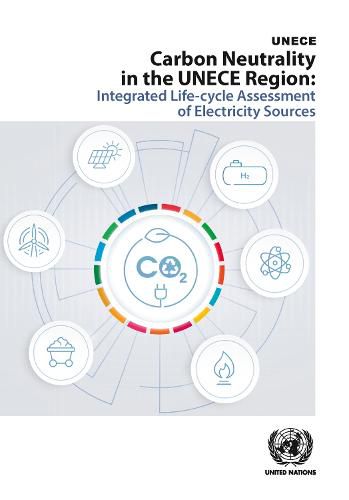Carbon neutrality in the UNECE region
United Nations: Economic Commission for Europe

Carbon neutrality in the UNECE region
United Nations: Economic Commission for Europe
Well-informed energy policy design is key to reaching decarbonization targets and keeping global climate change below a 2eC threshold. In particular, low-carbon electricity provision for all is essential, as the IPCC shows that the most ambitious climate mitigation scenarios involve the electrification of most of our economy. Therefore, understanding the full scale of potential impacts from current and future electricity generation is required, in order to avoid 'impact leakage', ie, increasing non-climate environmental pressure while reducing greenhouse gas emissions. Life cycle assessment allows the evaluation of a product over its life cycle, and across a wide range of environmental indicators - this method was chosen to report on the environmental profiles of various technologies. Candidate technologies assessed include coal, natural gas, hydropower, nuclear power, concentrated solar power (CSP), photovoltaics, and wind power. Twelve global regions included in the assessment, allowing to vary load factors, methane leakage rates, or background grid electricity consumption, among other factors. With no exception, every electricity generation technology generates environmental impacts over its life cycle; and these impacts may vary widely with implementation site and other design choices. Proper energy policy should consider site-specificity by conducting lifecycle assessments that consider local conditions and potential prospective changes. among other factors. With no exception, every electricity generation technology generates environmental impacts over its life cycle; and these impacts may vary widely with implementation site and other design choices. Proper energy policy should consider site-specificity by conducting lifecycle assessments that consider local conditions and potential prospective changes. among other factors. With no exception, every electricity generation technology generates environmental impacts over its life cycle; and these impacts may vary widely with implementation site and other design choices. Proper energy policy should consider site-specificity by conducting lifecycle assessments that consider local conditions and potential prospective changes
This item is not currently in-stock. It can be ordered online and is expected to ship in approx 4 weeks
Our stock data is updated periodically, and availability may change throughout the day for in-demand items. Please call the relevant shop for the most current stock information. Prices are subject to change without notice.
Sign in or become a Readings Member to add this title to a wishlist.


